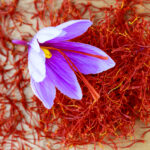5 ways saffron destroys cancer cells
 (NaturalHealth365) Saffron, an ancient cooking spice and staple of the Mediterranean diet, has also played an important role in traditional and herbal healing systems, including Ayurveda and traditional Chinese medicine.
(NaturalHealth365) Saffron, an ancient cooking spice and staple of the Mediterranean diet, has also played an important role in traditional and herbal healing systems, including Ayurveda and traditional Chinese medicine.
On top of that, exciting research highlights saffron’s ability to attack cancer cells on multiple fronts – at every stage of the disease. Keep reading to discover the five distinct ways saffron fights cancer.
The carotenoids in saffron stop the growth of cancer
With the growing realization that conventional cancer-fighting drugs not only feature devastating side effects but may themselves cause secondary cancers, many researchers are focusing on finding natural chemopreventive substances – in order to stop cancer from taking hold in the first place.
Saffron, made from the flowers of the Crocus sativa plant, contains three carotenoids – or antioxidant plant pigments – that have the potential to launch a preemptive strike against cancer.
Studies have shown that crocetin, crocin, and safranal in saffron inhibit the triggers – such as environmental toxins, oxidative damage from free radicals, radiation, inflammation, and viruses – that start the carcinogenic process. By actively protecting cell DNA from damage and mutation, saffron helps to defuse the risk posed by these initiators of cancer, stopping the growth of cancer before it even begins.
In animal studies, researchers found that oral administration of a saffron extract – given prior to the administration of a powerful laboratory-produced carcinogenic substance – completely prevented the formation of tumors – a striking result.
Saffron extracts cause aggressive cancer cells to kill themselves
The term apoptosis refers to the programmed cell death that ordinarily controls and regulates cell growth. Cancer cells lose their vulnerability to apoptosis, giving them their devastating ability to grow unchecked.
Crocetin, crocin, and safranal can all reverse this process by producing apoptosis, or cell suicide, in cancer cells – even in the case of aggressive cancers of the liver, lungs, and stomach.
A study published in Hepatology showed that a two-week pretreatment course of saffron caused apoptosis, blocked inflammation, and reduced the incidence and size of cancerous nodules of the liver, which had been developed as a result of the cancer-producing chemical diethylnitrosamine – a toxin found in such everyday substances as tobacco smoke, gasoline, and even processed foods.
In a world abounding with carcinogens, it’s easy to see why researchers believe saffron can be a powerful and protective ally. But saffron has additional cancer-fighting benefits to offer.
Saffron decreases production of destructive enzymes
In addition to blocking cancer triggers and creating apoptosis, saffron inhibits the production of matrix metalloproteinase, or MMP, one of the substances that cancer cells use to destroy the protein matrix between cells in healthy tissue, an important factor in the spread of cancer throughout the body.
According to researchers, crocetin from saffron was found to decrease breast cancer cell’s ability to produce MMP – reducing their invasiveness and successfully preventing them from penetrating and invading nearby healthy tissues. In fact, the team noted that crocetin “greatly attenuated” the production of MMP while also reducing levels of gelatinase – another enzyme that plays a central role in cancer invasiveness and tumor progression.
Saffron starves tumors of oxygen and nutrients
Crocetin, crocin, and safranal can suppress angiogenesis – the process by which tumors add new blood vessels. Researchers believe that they achieve this by reducing levels of a vital signaling molecule that tumors produce in order to form new blood supplies.
In this way, saffron helps to deprive tumor masses of blood, oxygen, and nutrients.
Crocetin has produced dramatic regression of pancreatic tumors – even after the tumors were already detectable – thereby giving rise to hope that saffron can reverse cancer growth.
Saffron suppresses inflammatory response
Scientists have long known that inflammation plays a key role in the development of cancer. Saffron’s powerful anti-inflammatory effects give it yet another weapon in its cancer-fighting arsenal.
In fact, researchers identified saffron’s inflammation-blocking properties as a key factor in the encouraging results of many cell and animal studies.
Finally, in a study published in Experimental Oncology, saffron caused a stunning reduction of proliferation in colon cancer cells – slashing the rate to 2.8 percent of the rate of untreated cells. And, it accomplished this without harming healthy cells.
Bonus: Saffron reduces the risk of harm from toxic chemotherapy drugs
One of the drawbacks of chemotherapy is that it can cause chemical changes in DNA that actually activate cancer genes and induce cancer-causing mutations. Not only do saffron’s carotenoids present no threat to healthy cells, they offer potent protection against this type of damage.
In fact, researchers found that saffron significantly inhibited DNA damage; specifically, it prevented breakage in fragile DNA strands.
Natural, safe, and non-toxic, saffron not only fights cancer on multiple fronts and at multiple stages but carries none of the risks of toxic conventional cancer treatments. It is easy to see why researchers are intrigued by saffron as a promising treatment for a deadly disease.
Sources for this article include:



